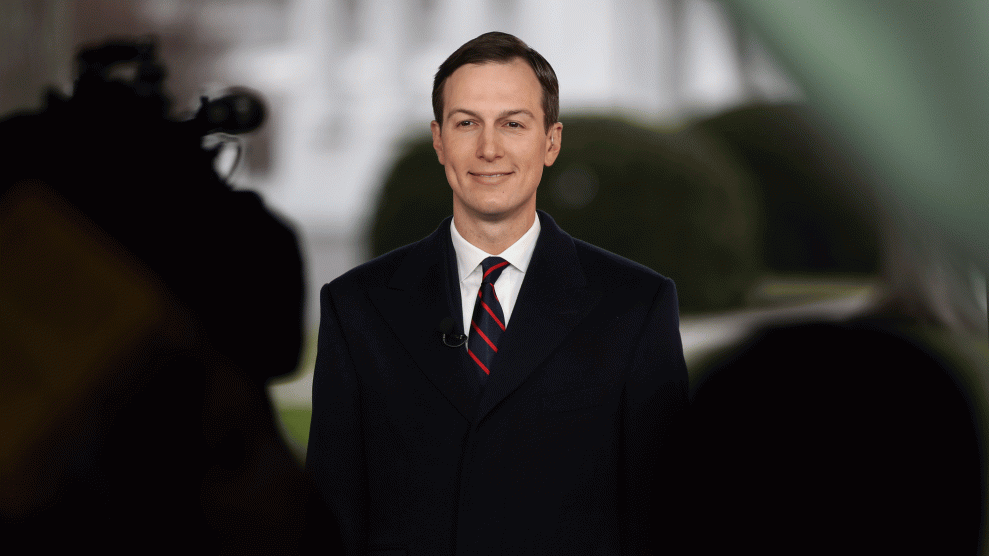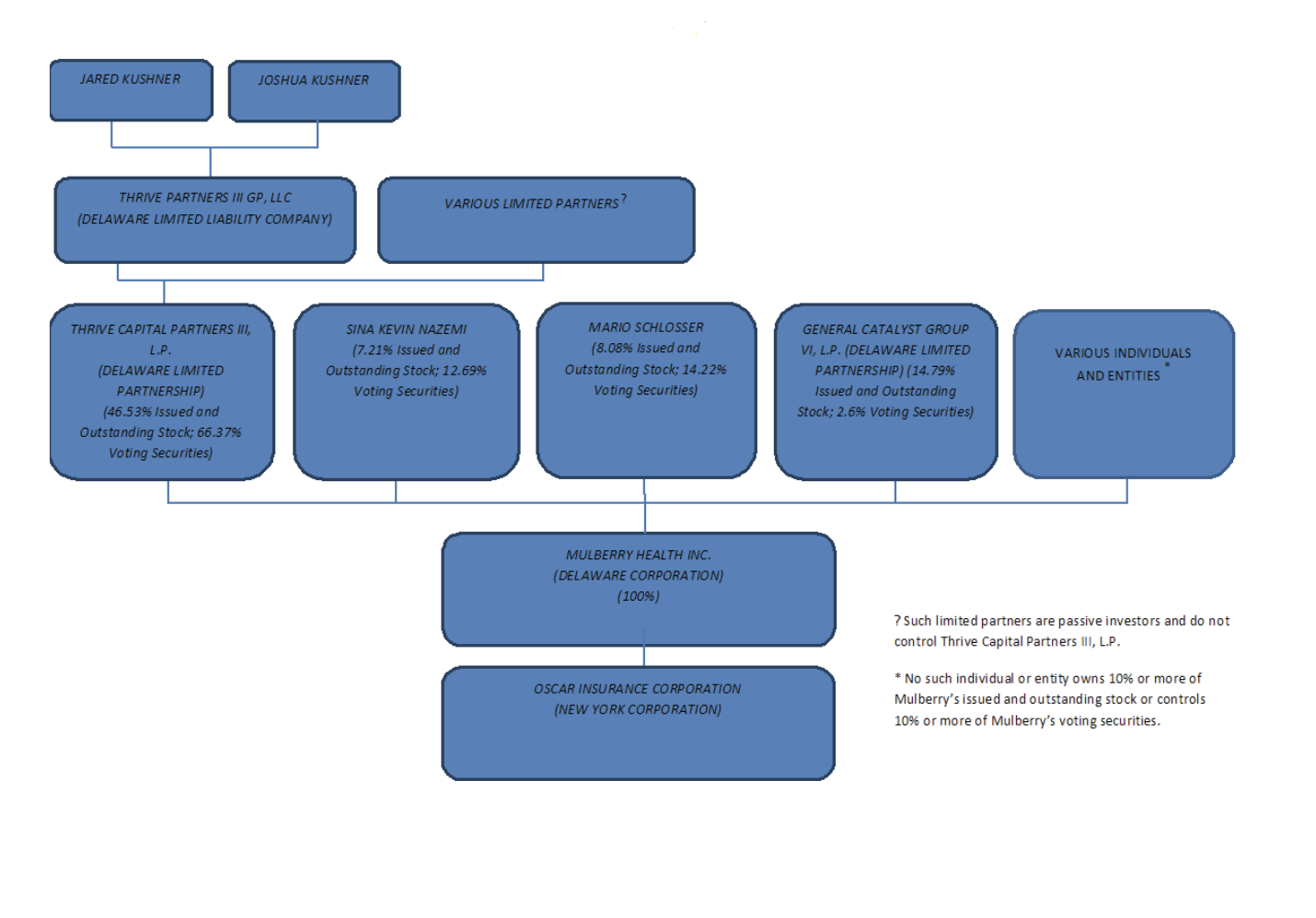
Oliver Contreras/AP
Jared Kushner, Donald Trump’s son-in-law and a top player in the White House’s coronavirus deliberations, several years ago controlled a family business that owned a health insurance company that is now marketing a website that aims to direct consumers to coronavirus testing locations. This firm, which is called Oscar, has often been described in media accounts as co-founded by Jared’s brother, Joshua, but New York State records reviewed by Mother Jones show that in 2013, the year the business was incorporated, Jared with his brother controlled the holding company that owned Oscar.
After Trump at a press conference last week falsely claimed that 1,700 Google engineers were developing a website that would within days be the central element of a national testing system, media reports noted that this misstep had occurred because Kushner had been talking to Verily, a Google subsidiary, about a pilot program it was developing for the San Francisco area. The project was in its infancy, but it looked to create a website that would let people evaluate their symptoms and direct them to nearby drive-through testing. There were no websites or testing centers yet. And no national website in the works at Verily or Google. Nevertheless, at that press conference, Dr. Deborah Birx, a member of the coronavirus task force, held up a poster that Kushner’s team had prepared showing how Trump’s promised website would look. “It’s going to be very quickly done, unlike websites of the past,” Trump inaccurately said.
That same day, Oscar, which bills itself as “a tech-driven health insurance company,” launched a website that it called “the first testing center locator for COVID-19 in the U.S.” It noted that this locator featured “more than 100 centers today.” And the company said the site was “accessible to the general public and more testing centers are being added every day.” As the Verge reported, the flow chart Kushner had developed was “eerily similar” to Oscar’s new website, and it noted that Oscar was “Kushner-linked” because “Joshua Kushner (brother to Jared) is a major investor in Oscar Health.”
An Oscar representative told the Verge that the company had no involvement in the White House effort: “We did not connect with the White House to provide input on their flow chart or tool idea before the press conference on Friday.” But there once was a direct connection between Jared Kushner and Oscar.
A 2013 examination of Oscar conducted by the New York State Department of Financial Services produced a report that detailed the firm’s corporate structure. It stated that Oscar, which was incorporated in New York, was owned by Mulberry Health Inc., a Delaware corporation, which in turn was mostly owned by Thrive Capital Partners III LP, a Delaware limited partnership, which itself was owned by Thrive Partners III GP LLC, a Delaware limited liability corporation and other unnamed parties.
And who owned Thrive Partners III GP LLC? Jared Kushner and his brother, Joshua Kushner. As the report put it, “Jared Kushner and Joshua Kushner are deemed the ultimate controlling persons in Oscar’s holding company system.”
If this seems confusing, here is the diagram the report included:

This indicates that Jared Kushner had a significant ownership interest in Oscar when it began. It was not just his brother’s company, as the firm has often been depicted.
A December 2018 state insurance exam, which reported on the firm’s corporate structure as of the end of 2015, noted a possible shift in ownership interests, reporting that at this point Joshua Kushner was “deemed the ultimate controlling person in Oscar’s holding company.” (By then, Trump’s presidential campaign was well under way, and Jared Kushner was helping to run it.) Yet the two Thrive entities remained the controlling parties in Oscar’s ownership structure, according to the 2018 report. And the financial disclosure form Jared Kushner filed when he entered the White House in 2017 showed that he had retained an interest in those venture funds.
According to this 2017 form, Kushner had made over $5 million the previous year through Thrive Partners III GP. (The 2013 New York State report said this was a venture fund of which he and his brother were the only members.) Kushner’s financial disclosure also stated that he made between $1 million and $5 million through the associated Thrive Capital Partners III LP. His disclosure form did not state what, if any revenue, came from Oscar. It did not list the individual investments held by these funds.
Kushner’s disclosure form reported that he had divested from these two funds when he was given a White House job by his father-in-law. As CNN reported, Kushner “dumped a stake worth as much as $30 million in Thrive Capital, an investment firm founded by his brother, Joshua Kushner.” And the Washington Post noted, “Jared’s lawyers have not confirmed if any his assets were directly sold to Joshua during the divestment process.”
Mother Jones sent a list of questions to the White House about Jared Kushner and Oscar. They included: Did anyone at Oscar have any input into the flow chart released by the White House at the press conference last week? Who did design the flow chart? How involved was Kushner with Oscar before he divested? Did Kushner solicit or receive any advice or input from his brother Joshua regarding how the Trump administration should respond to the coronavirus crisis?
A White House spokesperson replied with a single sentence: “Oscar had no involvement in this.” The White House did not address Jared Kushner’s previous financial tie to Oscar. A spokesperson for Oscar did respond to requests for comment.
Kushner’s role in the Trump White House’s response to the coronavirus pandemic has been controversial. The New York Times reported, “Mr. Kushner’s early involvement with dealing with the virus was in advising the president that the media’s coverage exaggerated the threat.” And the newspaper noted that Kushner “also sought to take on a more expansive role for himself despite his lack of knowledge on the topic and without talking to most of the task force members or public health experts.” Kushner was deeply involved with the error-ridden and market-tanking Oval Office address that Trump delivered last week. And he also privately asked Joshua’s father-in-law, Dr. Kurt Kloss, a New York-based physician, for advice. Afterward, Kloss posted an appeal on a Facebook group of emergency room doctors: “If you were in charge of the Federal response to the Pandemic what would your recommendations be?” Kloss asked the group, “I have direct channel to person now in charge at White House and have been asked for recommendations.”
Alphabet, Google’s parent company, invested early in Oscar, directly and also through Verily. And in 2018, Alphabet announced a grander investment of $375 million in the company for possibly a 10-percent ownership stake. That year, Wired noted, “The goal of Oscar is to do to health care what Uber did to the taxi industry: use smart digital technology to make everything faster and easier for customers, and then use the data gathered to build radically new services, which can collect more data that leads to new services.” That same year, the New York State Department of Financial Services fined Oscar $576,950 for violating insurance laws in several ways, including failing to accurately explain denials of coverage.
The coronavirus testing center locator that Oscar announced last week—which can be used for free—seems limited. When Mother Jones entered information for a person who was older than 60, who had had no exposure to anyone infected, who had not traveled overseas recently, and who had experienced no symptoms, it said that a test was not necessary. When the profile was changed to a person who had recently been in Europe, who had diabetes, and who was feeling a fever, the Oscar website advised to seek a coronavirus test and reported that the nearest testing site was in Kansas. The person in this scenario was logging in from Maryland. (Oscar has networks in only 15 states, including Kansas.) The site also pointed out that it might be necessary to get a referral from a medical provider in order to obtain a test.
Oscar is routinely depicted as Kushner-connected because of the ownership stake held by Joshua (who is married to model Karlie Kloss). But the 2013 New York State report portrays Jared as a key participant in Oscar at the start. Given this close link and Kushner’s role in Trump’s response to the coronavirus crisis, perhaps the White House ought to be more transparent about this relationship.













